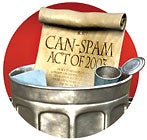Lewis
Member
Has the Internet Outgrown Spam?
Jul 2, 2011 7:30 pm
 Graphic: Diego AguirreIn the late 1990s Robert Soloway made $20,000 a day as a spammer. He drove fancy cars. He wore Armani clothes. He was, by all accounts, one of the most successful spammers on the planet. But if he were starting out today, he'd find some other line of work.
Graphic: Diego AguirreIn the late 1990s Robert Soloway made $20,000 a day as a spammer. He drove fancy cars. He wore Armani clothes. He was, by all accounts, one of the most successful spammers on the planet. But if he were starting out today, he'd find some other line of work.
In 2011, spamming just won't pay the bills. "It's not something financially feasible for anyone to even consider," says Soloway, who was released from the Federal Correctional Institution in Sheridan, Oregon a few months ago, after serving almost four years in prison for spamming.
 So-called Spam King Robert Soloway, recently released from prison.For a time, his business was good. He spammed people to advertise his company, Newport Internet Marketing, which in turn offered a full range of spamming services for the unscrupulous marketer. $195, for example, would buy a 15-day spam run targeting 2 million addresses. Those with more cash could pay $495 and the Spam King, as federal prosecutors called him, would hit 20 million inboxes.
So-called Spam King Robert Soloway, recently released from prison.For a time, his business was good. He spammed people to advertise his company, Newport Internet Marketing, which in turn offered a full range of spamming services for the unscrupulous marketer. $195, for example, would buy a 15-day spam run targeting 2 million addresses. Those with more cash could pay $495 and the Spam King, as federal prosecutors called him, would hit 20 million inboxes.
But Soloway now says that even before federal agents arrested him four years ago, spam was a losing proposition. In 2007, "when I had ten years of experience and knew every possible way to send out spam," he was still losing money, he said.
His problem? Spam filters had become too good. In 1997 Soloway was making his $20,000 a day with just one Earthlink account and a single mail server. Ten years later, he had hundreds, perhaps thousands of accounts, computers and Internet domains which he used to play an increasingly complex game of cat-and-mouse with the antispam crusaders trying to shut him down. When he finally stopped, he was making just $20 per day. "That should tell you how effective the antispam community has become," he said.
Spam Pales Amid Cybercrime
With each passing year, the reports of criminal activity on the Internet seem to get more disturbing. Distributed denial of service attacks knock entire nations offline; criminal gangs make off with hundreds of millions of dollars using stolen bank card data, a nation's nuclear ambitions are thwarted by a new type of computer worm.
 Spam volume trends (click to enlarge chart). Source: Cisco
Spam volume trends (click to enlarge chart). Source: Cisco
But lately a ray of light has cut through all the gloom. Spam -- the Internet's original sin -- dropped in volume for the first time ever at the end of 2010. In September, Cisco System's IronPort group was tracking 300 billion spam messages per day. By April, the volume had shrunk to 34 billion per day, a remarkable decline. "The largest spam-sending botnets are being shut down and a lot of the big pharmaceutical spam has disappeared," said Nilesh Bhandari, a product manager with Cisco.
Spam watchers say a handful of high-profile arrests at the end of 2010 put a dent in the business, but there may be a bigger issue: E-mail spamming, at least in its traditional form, may not be as profitable as it once was.
"You don't see a lot of new blood coming to the table," said Joe Stewart, a researcher with Dell's SecureWorks group. Every year or two Stewart takes a look at the top spamming botnets on the Internet. He analyzes spam messages and tracks down the networks of hacked computers responsible for sending them out.
This year, the news was that there was no news. Stewart didn't find any new spam botnets. "Everything that is spamming today is pretty much what was spamming two years ago," he said in February when he released his latest report.
There was a brief, halcyon day when the Internet, or rather its precursor, the Arpanet, was spam-free. But then a Digital Equipment Corporation marketer named Gary Thuerk decided to let a few hundred Arpanet users know about his new DecSystem-20 mainframes, and it was downhill from there. When consumers flocked to the Internet in the mid 1990s -- Soloway's glory days -- the open online culture provided a breeding ground for fraudsters, and soon the vast majority of all messages on the Internet was unsolicited commercial e-mail.
Spammers Shift Tactics
Until recently, spammers were in an ugly war of attrition. As spam filters got better and better, spammers bumped up the volume of messages they pumped out. If a fraction of one percent of a million messages get through, that's not profitable. Make that a billion messages and the money starts to add up. But it now seems as though this war of escalation has subsided; not because the spammers have given up, but because the game is changing.
Jul 2, 2011 7:30 pm

In 2011, spamming just won't pay the bills. "It's not something financially feasible for anyone to even consider," says Soloway, who was released from the Federal Correctional Institution in Sheridan, Oregon a few months ago, after serving almost four years in prison for spamming.

But Soloway now says that even before federal agents arrested him four years ago, spam was a losing proposition. In 2007, "when I had ten years of experience and knew every possible way to send out spam," he was still losing money, he said.
His problem? Spam filters had become too good. In 1997 Soloway was making his $20,000 a day with just one Earthlink account and a single mail server. Ten years later, he had hundreds, perhaps thousands of accounts, computers and Internet domains which he used to play an increasingly complex game of cat-and-mouse with the antispam crusaders trying to shut him down. When he finally stopped, he was making just $20 per day. "That should tell you how effective the antispam community has become," he said.
Spam Pales Amid Cybercrime
With each passing year, the reports of criminal activity on the Internet seem to get more disturbing. Distributed denial of service attacks knock entire nations offline; criminal gangs make off with hundreds of millions of dollars using stolen bank card data, a nation's nuclear ambitions are thwarted by a new type of computer worm.
 Spam volume trends (click to enlarge chart). Source: Cisco
Spam volume trends (click to enlarge chart). Source: CiscoBut lately a ray of light has cut through all the gloom. Spam -- the Internet's original sin -- dropped in volume for the first time ever at the end of 2010. In September, Cisco System's IronPort group was tracking 300 billion spam messages per day. By April, the volume had shrunk to 34 billion per day, a remarkable decline. "The largest spam-sending botnets are being shut down and a lot of the big pharmaceutical spam has disappeared," said Nilesh Bhandari, a product manager with Cisco.
Spam watchers say a handful of high-profile arrests at the end of 2010 put a dent in the business, but there may be a bigger issue: E-mail spamming, at least in its traditional form, may not be as profitable as it once was.
"You don't see a lot of new blood coming to the table," said Joe Stewart, a researcher with Dell's SecureWorks group. Every year or two Stewart takes a look at the top spamming botnets on the Internet. He analyzes spam messages and tracks down the networks of hacked computers responsible for sending them out.
This year, the news was that there was no news. Stewart didn't find any new spam botnets. "Everything that is spamming today is pretty much what was spamming two years ago," he said in February when he released his latest report.
There was a brief, halcyon day when the Internet, or rather its precursor, the Arpanet, was spam-free. But then a Digital Equipment Corporation marketer named Gary Thuerk decided to let a few hundred Arpanet users know about his new DecSystem-20 mainframes, and it was downhill from there. When consumers flocked to the Internet in the mid 1990s -- Soloway's glory days -- the open online culture provided a breeding ground for fraudsters, and soon the vast majority of all messages on the Internet was unsolicited commercial e-mail.
Spammers Shift Tactics
Until recently, spammers were in an ugly war of attrition. As spam filters got better and better, spammers bumped up the volume of messages they pumped out. If a fraction of one percent of a million messages get through, that's not profitable. Make that a billion messages and the money starts to add up. But it now seems as though this war of escalation has subsided; not because the spammers have given up, but because the game is changing.









 :bigfrown
:bigfrown